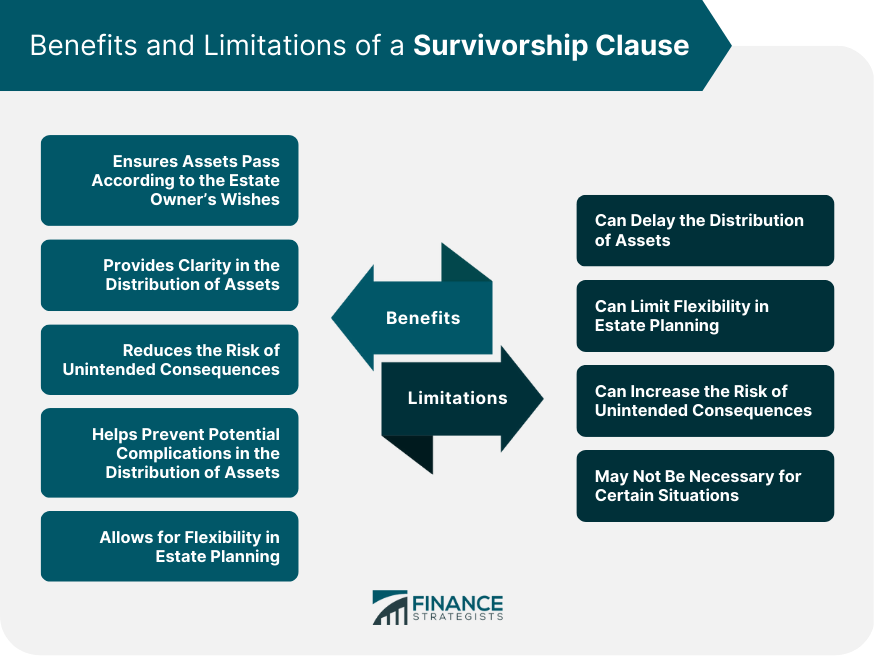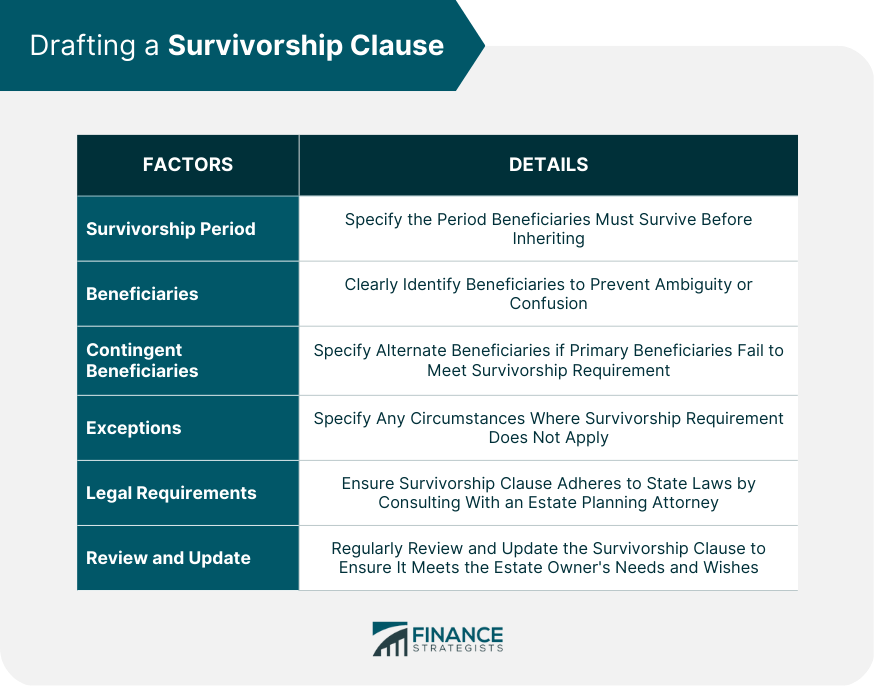A survivorship clause is a provision in a will or trust that requires beneficiaries to survive for a specified period after the estate owner's death before they can inherit assets. The purpose of a survivorship clause is to ensure that the assets pass to the intended beneficiaries and prevent unintended consequences, such as the assets passing to unintended beneficiaries or being subject to probate. Survivorship clauses are commonly used in estate planning when there are multiple beneficiaries involved. For instance, if an estate owner wants to leave their assets to their children but one child predeceases them, without a survivorship clause, the deceased child's share of the assets could pass to their heirs rather than the other children. State laws play an important role in the validity and enforceability of survivorship clauses in estate planning. While survivorship clauses are commonly used in estate planning, the laws surrounding them can vary from state to state. In some states, survivorship clauses are required by law. For example, in California, a beneficiary must survive the estate owned by at least five days to inherit under a will or trust. If a beneficiary fails to meet the survivorship requirement, their share of the assets will pass to the alternate beneficiaries named in the will or trust. Other states, such as Florida and Illinois, have similar laws requiring a beneficiary to survive for a certain period after the estate owner's death. Understanding the state laws regarding survivorship clauses is essential when creating an estate plan. If a survivorship clause is required by law, failing to include one can result in unintended consequences, such as the assets passing to unintended beneficiaries or being subject to probate. On the other hand, including a survivorship clause in a state where it is not required can provide clarity and prevent potential complications in the distribution of assets. It is important to consult with an estate planning attorney to ensure that the survivorship clause is valid, enforceable, and adheres to state laws. An estate planning attorney can help navigate the complex laws surrounding survivorship clauses and ensure that the estate plan meets the specific needs and wishes of the estate owner. Including a survivorship clause in an estate plan offers several benefits to the estate owner and their beneficiaries. Some of the key benefits of including a survivorship clause in an estate plan are: A survivorship clause ensures that the assets pass to the intended beneficiaries, not unintended ones. This is especially important in situations where there are multiple beneficiaries involved. By requiring beneficiaries to survive for a specific period after the estate owner's death, the estate owner can ensure that their assets pass according to their wishes. A survivorship clause provides clarity in the distribution of assets by specifying the requirements for beneficiaries to inherit. This can help prevent potential disputes among beneficiaries and provide peace of mind for the estate owner. Without a survivorship clause, the assets could pass to unintended beneficiaries or be subject to probate. By including a survivorship clause, the estate owner can ensure that their assets pass to the intended beneficiaries and reduce the risk of unintended consequences in the distribution of assets. A survivorship clause can help prevent potential complications in the distribution of assets by ensuring that the assets pass to the intended beneficiaries. This can help reduce the risk of probate and provide peace of mind for the estate owner and their beneficiaries. A survivorship clause allows for flexibility in estate planning by providing an additional layer of control over the distribution of assets. For example, the survivorship clause can specify the period that beneficiaries must survive, which can vary depending on the estate owner's wishes and the beneficiaries' circumstances. While survivorship clauses offer several benefits in estate planning, they also have some limitations that estate owners should be aware of when creating an estate plan. Some of the key limitations of survivorship clauses are: Including a survivorship clause in an estate plan can delay the distribution of assets to beneficiaries. If a beneficiary fails to meet the survivorship requirement, their share of the assets will pass to the alternate beneficiaries named in the will or trust. This can delay the distribution of assets and potentially cause financial hardship for the beneficiaries. While a survivorship clause allows for flexibility in estate planning, it can also limit flexibility by specifying the requirements for beneficiaries to inherit. For example, if the survivorship period is too long, it can limit the estate owner's ability to change the beneficiaries or modify the terms of the will or trust. While a survivorship clause can help prevent unintended consequences in the distribution of assets, it can also increase the risk of unintended consequences. For example, if a beneficiary fails to meet the survivorship requirement, their share of the assets will pass to the alternate beneficiaries named in the will or trust, which may not be the intended beneficiaries. In some situations, including a survivorship clause may not be necessary. For example, if the estate owner has only one beneficiary or all the beneficiaries are the same age and in good health, a survivorship clause may not be necessary and can add unnecessary complexity to the estate plan. Drafting a survivorship clause requires careful consideration and attention to detail to ensure that it is valid and enforceable. Here are some key factors to consider when drafting a survivorship clause: The survivorship clause should specify the period that beneficiaries must survive before they can inherit. Depending on the estate owner's wishes and the beneficiaries' circumstances, this period can range from a few days to several months or even years. However, it is important to ensure that the period is not so long that it would cause unintended consequences or complications. The survivorship clause should specify the beneficiaries who must meet the survivorship requirement to inherit. It is important to ensure that the clause is specific and clear in identifying the beneficiaries to prevent any ambiguity or confusion in the distribution of assets. The survivorship clause should also specify the alternate or contingent beneficiaries who will inherit if the primary beneficiaries fail to meet the survivorship requirement. It is important to ensure that the alternate or contingent beneficiaries are also specific and clear in identifying to prevent any ambiguity or confusion in the distribution of assets. The survivorship clause should also specify any exceptions or circumstances where the survivorship requirement does not apply. For example, the survivorship requirement may not apply if the beneficiaries are the estate owner's spouse or children. The survivorship clause should adhere to any legal requirements in the state where the estate owner resides. It is important to consult with an estate planning attorney to ensure that the survivorship clause is valid, enforceable, and adheres to state laws. Finally, the survivorship clause should be reviewed and updated regularly to ensure that it still meets the estate owner's needs and wishes. Life circumstances can change, and the survivorship clause may need to be modified accordingly. A survivorship clause is a provision in a will or trust that requires beneficiaries to survive for a specified period after the estate owner's death before they can inherit assets. This clause ensures that the assets pass to the intended beneficiaries and prevent unintended consequences. Understanding the state laws regarding survivorship clauses is important to ensure their validity and enforceability. Survivorship clauses have several benefits, including ensuring assets pass according to the estate owner’s wishes, providing clarity in the distribution of assets, reducing the risk of unintended consequences, helping prevent potential complications in the distribution of assets, and allowing for flexibility in estate planning. However, they also have limitations, such as delaying the distribution of assets and limiting flexibility in estate planning. Estate owners should seek help from an estate planning attorney to draft a valid and enforceable survivorship clause that meets their needs and wishes.What Is a Survivorship Clause?
State Laws and Survivorship Clauses
Benefits of a Survivorship Clause
Ensures Assets Pass According to the Estate Owner’s Wishes
Provides Clarity in the Distribution of Assets
Reduces the Risk of Unintended Consequences
Helps Prevent Potential Complications in the Distribution of Assets
Allows for Flexibility in Estate Planning
Limitations of a Survivorship Clause
Can Delay the Distribution of Assets
Can Limit Flexibility in Estate Planning
Can Increase the Risk of Unintended Consequences
May Not Be Necessary for Certain Situations

Drafting a Survivorship Clause
Survivorship Period
Beneficiaries
Contingent Beneficiaries
Exceptions
Legal Requirements
Review and Update

Final Thoughts
Survivorship Clause FAQs
A survivorship clause ensures that beneficiaries survive for a specified period after the estate owner's death before they can inherit assets, preventing unintended consequences.
Survivorship clause laws can vary from state to state. In some states, a survivorship clause is required by law, while in others, it is not. Consult with an estate planning attorney to determine the laws in your state.
A survivorship clause clarifies asset distribution, reduces the risk of unintended consequences, and allows for flexibility in estate planning.
A survivorship clause can delay the distribution of assets, limit flexibility in estate planning, and may not be necessary for certain situations.
When drafting a survivorship clause, consider the survivorship period, beneficiaries, contingent beneficiaries, exceptions, and legal requirements, and review and update regularly. It is recommended to consult with an estate planning attorney to ensure that the clause is valid and enforceable.
True Tamplin is a published author, public speaker, CEO of UpDigital, and founder of Finance Strategists.
True is a Certified Educator in Personal Finance (CEPF®), author of The Handy Financial Ratios Guide, a member of the Society for Advancing Business Editing and Writing, contributes to his financial education site, Finance Strategists, and has spoken to various financial communities such as the CFA Institute, as well as university students like his Alma mater, Biola University, where he received a bachelor of science in business and data analytics.
To learn more about True, visit his personal website or view his author profiles on Amazon, Nasdaq and Forbes.











